
Sometimes, going back to the well turns out to be the smartest move you can make. For 2016, Suzuki returns to a trusted source by reintroducing the Bandit 1250S ABS refreshed with a slight wardrobe change. The Big Bandit legacy began in 1997 with the original four-cylinder 1200, the air-cooled 1,152cc carbureted old-school version. Today’s lightly warmed-over Bandit 1250S springs forth from the liquid-cooled, fuel-injected 1,255cc remake of 2007, a bike that last proved itself a solid performer in fully-faired GSX1250FA form (Rider, June 2011). This 2016 update features a new, more aerodynamic half-fairing adorning an otherwise unchanged rolling chassis, so it’s all very familiar to riders who have been around a while.
Lacking any changes to the main mechanicals since our last test, the 2016 Suzuki Bandit 1250S might seem to be at a disadvantage in the current sport-touring market where there’s so much new competition. Just for starters, in-house rivals include Suzuki’s new-for-2016 GSX-S750 and GSX-S1000F, along with the highly regarded and very versatile 1,037cc V-Strom 1000 crossover. So why bring back an essentially unchanged Bandit 1250? Two convincing reasons: It’s still a very good all-around ride, and now priced at $9,899 it’s a damn strong value to boot.

Since this new Bandit opens back-to-the-well reminiscing, I decided to ride it from Southern California back to my old stomping grounds around the San Francisco Peninsula where I first discovered the joys of motorcycling. Why? We still have lots of family up north, including my nephew Peter, who recently turned 15 years old. I got him started riding dirt bikes years ago, and now he’s eyeing street bikes. He’ll get his driver’s permit soon, so he can immediately set out on his own aboard two wheels—something not allowed in a car or truck in California.
Through the years, I’ve filled his head with many stories about my riding exploits in the nearby Skyline/Pescadero/La Honda area back when I was a mere teenager. And he’s been to Alice’s Restaurant, the well-known hangout where bikes gather on weekends. So naturally, he’s been begging me to take him on a ride; sort of a scouting trip, if you will. That’s if his parents—who don’t ride—allow him to actually get a street bike. That’s still a topic under much debate. But don’t blame me; Uncle Ken’s just a conduit….

Long overdue on my promise to show him these fantastic roads firsthand, I strapped some bags on the Bandit and started out my quick weekend visit with a fast freeway shot up to the Bay Area—about 350 straight miles, stopping only three times for fuel and one cup of coffee. The Bandit proved itself a strong freeway cruiser, always inviting you to pass the next car ahead; you have to watch out for speed creep since the engine pulls with zero effort, zero vibration and hardly a hint of exhaust noise.
Tuned for tons of grunt from right off idle, the Bandit delivers an exceptionally strong, very flat powerband. Careful here; be advised that not all tabletop-torque-curves are created equal. Sometimes, the phrase “a flat torque curve” is actually code for an engine that’s unresponsive, a bike that’s boring. Definitely not the case here. This engine feels delightfully strong right from the get-go and revs eagerly as the horsepower ramps up, pouring out fantastic performance all the way to the 9,500-rpm redline. It’s a great motor to live with in all street-riding conditions, loads of make-you-grin power on tap, just waiting to be unleashed.

Gobbling up the miles as Saturday turned dark, I noticed the Bandit provides excellent ergonomics; fairly upright position with seat/bar/peg relationships nearly perfect for my 6-foot frame, more so after I adjusted the seat upward via reversible rubber supports. There’s lots of space on the well-padded, flat seat to shift back and forth, which allows altering pressure points to delay butt aches. Depending on where I’m sitting and how my torso is angled, the wind stream hits me in the chinbar area, anywhere from the bottom to two inches above the upper edge. No turbulence thanks to a clean, laminar flow off the windscreen, but you get a bit of helmet lift and the helmet interior gets a tad drafty. A taller windscreen could eliminate these effects, but at the cost of a less streamlined look. Only a small niggle here; overall there’s very serviceable weather protection, proven by the 100 miles of rain I had to slog through. Also, ride is on the firm side of medium, yet not harsh. I’ll gladly trade off cushy comfort for twisty-road performance—a benefit I’d soon reap.

Peter and his folks greeted me with a warm welcome and a hot toddy, and the next morning Peter was more than eager to help wash away the rain grime; that’s the kind of kid he is. We had to get the bike looking presentable for the photo stops I planned during Sunday’s ride at landmark spots including Alice’s, Apple Jack’s, the San Gregorio General Store and Duarte’s Tavern in Pescadero, even though the weather still looked cloudy, damp and threatening.
He’s growing like a weed, weighing in at about 160 pounds now, so I had already dialed in more fork spring preload, down to the second ring instead of the standard three of five markings. The rear shock I left in the standard middle-of-the-road settings, largely because the adjusters for spring preload and rebound damping on the single-shock rear setup are so difficult to access. These settings worked just fine solo and for our day of two-up adventuring.
We quickly arrived at Kings Mountain Road outside the town of Woodside, a longtime favorite tortuous path bordered by oaks, redwoods, moss and ferns. Zooming uphill at a decidedly quick (but safe!) pace, the Bandit was a joy. Despite our combined load, the super-strong engine didn’t seem to notice Peter’s weight as it rocketed forward. Steering characteristics with the Bandit, however, are not especially intuitive; it obediently follows steering inputs, but it lacks an inherent eagerness for seamless steering transitions that would let it dance down tight roads with instinctive ease.

Although it lacks that automatic man/machine mind-meld present in the best sport machines, it still makes for a very sporting mount overall. In fast arcing sweepers that are more open, once initial turn-in is accomplished the Bandit tracks with solid confidence, a reassuringly stable platform—just as it is on the freeway and at elevated speeds.
Brakes front and rear are strong and progressive, but the front doesn’t return much feedback; it has a somewhat wooden feel to it. It’s not a functional problem, but the Bandit’s brakes are definitely not as viscerally pleasing in use as newer, radial-mount front brakes.
Fuel metering is flawless, but there’s a small bit of driveline lash in the lower gears that becomes essentially inconsequential because it disappears in the upper gears, especially fifth and sixth. That’s where you live most of the time thanks to the abundant torque. Our two-up twisty road escapades dropped fuel consumption to a mere 33 mpg, but freeway travel showed nearly 43 mpg, close to 200 miles of riding range if you need to stretch things.

Unfortunately, light rain showers had us running for home by late afternoon, cutting our riding itinerary short. We had covered a lot of territory, however, visiting places Peter had never seen even though he lives so close by. He said Kings Mountain, Tunitas Creek Road and Stage Road stand out as his favorites, and Alice’s is always a treat.
Upon my Monday departure I treated myself to a ride through Carmel and down Pacific Coast Highway to Cambria, an always-fun route that’s even better in winter when the crush of tourists—and the resulting traffic—dies down. The cloud cover hung on and a few light sprinkles fell, but they did nothing to dampen the continuing fun.
So it took three jam-packed days to visit my nephew to demonstrate street bikes are every bit as fun as dirt bikes—a truism he might end up pursuing the rest of his life. Was it worth burning up a weekend? Darn right it was. Would I choose the Suzuki Bandit 1250S to ride if I had to do it again? Darn right I would. In fact, Peter said he could hardly wait for my next visit. And he wants me to bring the Bandit.

2016 Suzuki Bandit 1250S ABS
Base Price: $9,899
Warranty: 1 yr., unltd. miles
Website: suzukicycles.com

Engine
Type: Liquid-cooled, transverse in-line four
Displacement: 1,255cc
Bore x Stroke: 79.0 x 64.0mm
Compression Ratio: 10.5:1
Valve Train: DOHC, 4 valves per cyl.
Valve Insp. Interval: 14,500 miles
Fuel Delivery: 36mm dual throttle valve EFI x 4
Lubrication System: Wet sump, 3.7-qt. cap.
Transmission: 6-speed, hydraulically actuated wet clutch
Final Drive: O-ring chain
Electrical
Ignition: Digital transistorized
Charging Output: 400 watts @ 5,000 rpm
Battery: 12V 10AH

Chassis
Frame: Tubular-steel perimeter w/ box-section aluminum swingarm
Wheelbase: 58.5 in.
Rake/Trail: 25.3 degrees/4.1 in.
Seat Height: 31.7/32.5 in.
Suspension, Front: 43mm stanchions, adj. for spring preload w/ 5.1-in. travel
Rear: Single shock, adj. for spring preload & rebound damping w/ 5.4-in. travel
Brakes, Front: Dual floating discs w/ opposed 4-piston calipers & ABS
Rear: Single disc w/ 1-piston pin-slide caliper & ABS
Wheels, Front: Cast, 3.5 x 17 in.
Rear: Cast, 5.5 x 17 in.
Tires, Front: 120/70-ZR17
Rear: 180/55-ZR17
Wet Weight: 558 lbs.
Load Capacity: 490 lbs.
GVWR: 1,048 lbs.
Performance
Fuel Capacity: 5.0 gals., last 1.0 gal. warning light on
MPG: 87 PON min. (low/avg/high) 32.9/39.7/42.9
Estimated Range: 198 miles
Indicated RPM at 60 MPH: 3,200

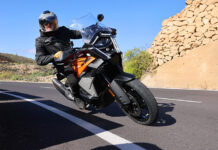
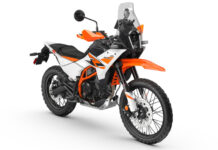
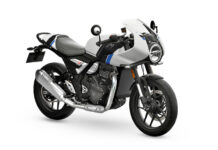
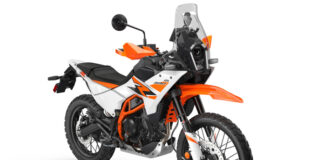
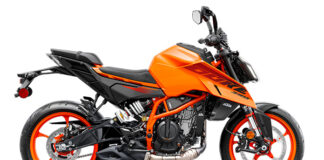
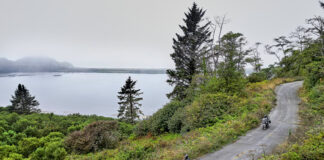

Showing a dyno chart with 102 horsepower implies that it’s rear wheel horsepower. Is that correct? That’s a lot if it is. I don’t believe so. I think it’s fake news.
Anytime we show a dyno chart in one of our reviews, it’s because we took the bike to Jett Tuning to be tested on their Dyno machine. Jett Tuning is a highly respected shop, and we can assure you that the numbers are accurate. Remember, we are located very close to the coastline, and as such we are at sea level.
Sure glad I bought one of these bikes after reading your review. It does not have all of the rider assist technolgy crap that is on new bikes and no TFT screen.